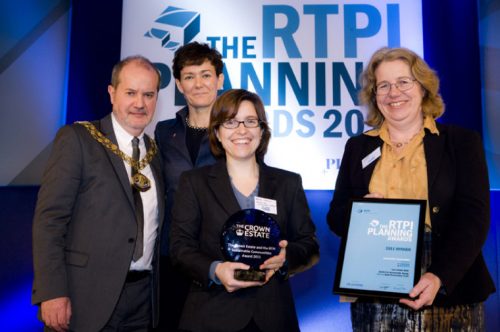Low Carbon Bath (now Warmer Bath), a guide to improving the energy efficiency of traditional homes in the historic City of Bath, has beaten off stiff competition to receive the Royal Town Planning Institute’s (RTPI) prestigious national Sustainable Communities award, sponsored by the Crown Estate.
The judges’ report noted the difficulty of the task: “Historic urban environments face often conflicting agendas around the preservation of heritage value, tackling climate change and ensuring decent living conditions for citizens. These agendas can be difficult for local authorities to reconcile. Low Carbon Bath demonstrates that solutions can be found when local communities come together to explore the practical details and impacts of low carbon development, and to evaluate what it is that they really value about their historic environment”.
Colin Haylock, the President of the RTPI, congratulated the category winners: “The RTPI awards recognise the very best that the profession has to offer. Planning is all about making great places, balancing often competing interests, and finding practical ways to overcome challenges. Given the stiff competition, a category award is a significant professional achievement”.
Bath Preservation Trust’s Conservation Officer Joanna Robinson co-authored the Warmer Bath report with CSE’s Will Anderson which came from Low Carbon Bath. She said: “We are delighted that Low Carbon Bath has been recognised for the innovative and extensive piece of research and advice that it is. Sharing its principles for improving energy efficiency standards in historic properties assists both the conservation and environmental lobbies and it is thrilling to see Bath leading in this important work”.
Representatives from Bristol-based charity CSE and BPT were in London on 23rd February to receive the award, presented by Crown Estate’s Chief Executive, Alison Nimmo. In total, there were 139 entries and 34 short listed for 9 planning categories.
CSE’s Rachel Coxcoon, who managed Low Carbon Bath, said: “We are surprised and very pleased to have received this award. It shows the RTPI recognised the manner in which, through this process, so many people became engaged with planning issues and understood how planning affects them personally”.
Produced in partnership between the two organisations, the guide is 76 pages of practical guidance for the owners of Bath’s traditional buildings and makes it clear how these architectural gems can be made more energy efficient without harm to their heritage value.
The guidance has been so well received it is being included in the development of retrofitting policy in Bath and North East Somerset (B&NES) Council’s Local Development Framework. It has also been heralded as a must-read by authorities in several other historic cities in the UK.
The guidance had already been awarded a Commendation in the RTPI’s Other Planning Work category at its annual planning achievement awards for the South West.
Caroline Kay, Chief Executive of Bath Preservation Trust, said: “We are delighted and honoured to have received this national award for our work with CSE on Low Carbon Bath. We believe it shows a recognition that the heritage and environmental agendas can and indeed must work together.”


